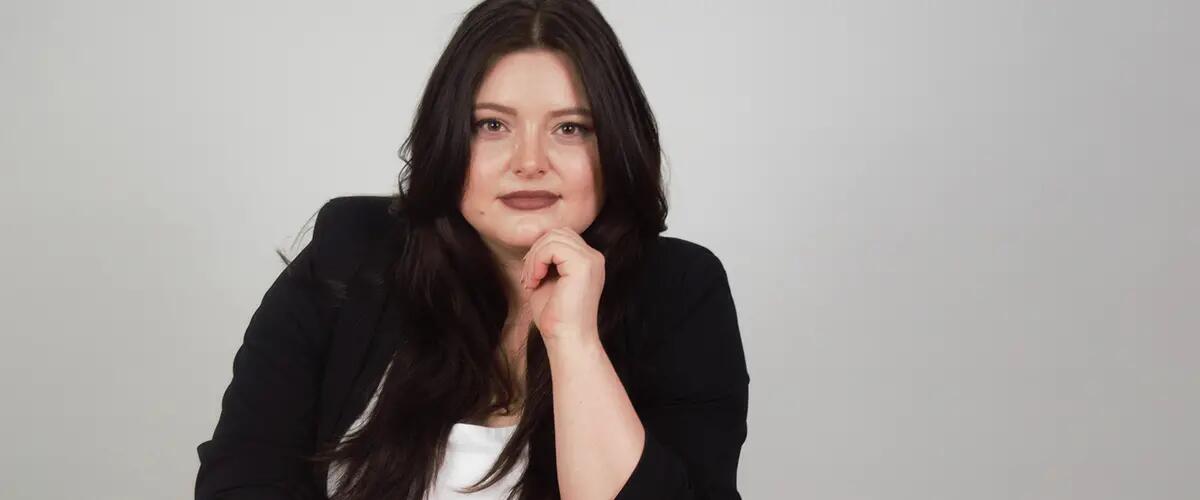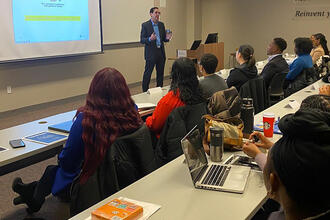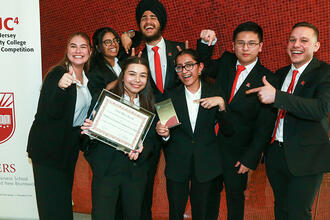
The Transformative Power of Mentoring
“It’s okay that you’re scared to show your magic to the world. They’ve burned witches for far less powerful magic than the kind you carry in your soul.” Those are the opening lines of a poem titled “Set the World Ablaze” by Hannah Salto, posted on her personal website. They don’t tell you everything you need to know about Salto, assistant dean of Student Support, Engagement and Leadership at Rutgers Business School. But they speak volumes about her approach to supporting and inspiring students and about the way she herself moves through the world.
When she was younger and people asked her what she wanted to do with her life, she’d tell them, “I don’t know, but I know that I want to make an impact and make people feel seen and cared for.” She does that every day, as a leader, mentor, and friend to the students she works with in Rutgers Business School mentoring programs like UFirst, serving first-generation college students; TeamUP, which pairs undergraduates with mentors in the business world; and Women BUILD, a three-year leadership program for high-achieving undergraduates offering mentorships, networking opportunities within and beyond RBS, projects in leadership and social responsibility, and a course in gender and leadership.
Victoria Benaroya says Salto changed her life “and she doesn’t even know it.” A current senior, Benaroya has been a participant in Women BUILD since her freshman year. As a sophomore, she had received an internship with an investment bank and was despondent when the bank, learning she wasn’t a U.S. citizen, rescinded the offer. “I was incredibly down,” she recalls, “and I didn’t know how to move forward.” Then, after a Women BUILD-sponsored event, Salto invited a group of students to join her in an informal chat, telling them, “I just want you all to know that you’re going to be amazing. I’ll always be there for you, and you can do whatever you want.”
“She didn’t know what I was going through,” says Benaroya. “But I just needed someone to say that to me.” Those words gave Benaroya the confidence to find not just another internship but also a job working in the institutional client service group at the financial management company BlackRock, beginning after her graduation this May.
Students seem to understand instinctively that Salto’s support and words of encouragement are heartfelt. In fact, her empathy grew out of difficult events in her personal life that she freely shares. “When I was twelve, my fifteen-year-old brother passed away from suicide,” she says. “It was obviously very traumatic, but it fed into my belief that we need to care for each other.” She’s also suffered from anxiety and depression, experiences that have allowed her to advise and empathize with students dealing with similar mental health issues. Nevertheless, when students talk about Salto, they tend to emphasize the positive, using upbeat expressions like “bubbly.”
“You always know when she’s in a room,” says Benaroya, “because her laugh is just so contagious.”
Mentorship, which Salto describes as “vital to everything we do in life,” certainly played a role. Her own mentors – among whom she counts an English professor, a resident director, and her mother – helped her understand her professional strengths: “I’m very human-focused, but I’m also very analytical,” she says. “I didn’t necessarily realize that until one of my mentors told me I had a unique skillset.” She understands that the importance of mentoring can easily be overlooked in a culture that elevates what she calls “the bootstraps mentality” – the idea that we should succeed solely on our own steam. “But in reality,” she says, “the way we grow and get what we need is through our connections with other people.” That’s an especially important message, she notes, for first-generation college students, who make up about 35 percent of Women BUILD and who often don’t have existing connections in the business community or the community at large. Programs like UFirst and Women BUILD don’t just offer first-generation students one-on-one mentorships; they also help them network with successful businesspeople they’d likely not meet otherwise.
“To me,” she says, “authenticity and bravery are synonyms, and it’s empowering to share your light.” It’s probably no coincidence that Alexandre describes Salto as “a light” and that Benaroya, who characterizes her as “pure kindness,” says that being around Salto “is like standing in the sun.” Those are all apt ways to describe a woman whose poetry urges readers, as Salto surely would urge the students she works with, to set the world ablaze.
-By Leslie Garisto Pfaff
Press: For all media inquiries see our Media Kit


